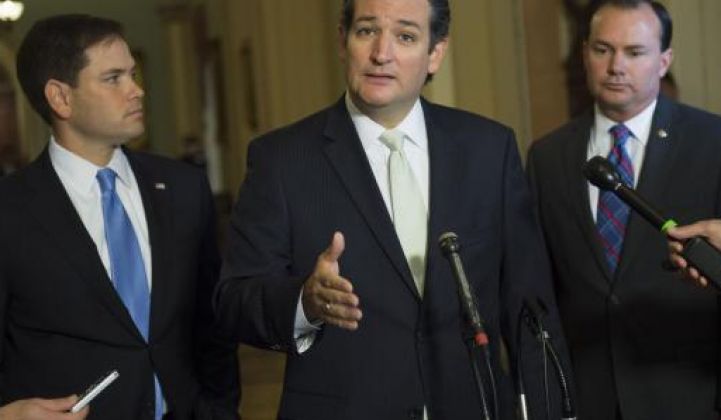The U.S. Export-Import Bank saw its authorization expire on June 30 at the hands of a Republican-led effort to shutter the institution. Soon after, six Republican senators, three of whom are running for President, requested the bank's plan for “orderly liquidation” in a letter to Fred Hochberg, the Ex-Im Bank's chairman, as reported in Roll Call.
The 80-year-old U.S. Export-Import Bank's mission is was to provide loans, guarantees and credits that allow foreign buyers to finance U.S. exports and U.S. exporters to get paid. The bank claims that a large majority of its customers are small businesses.
In 2014, the Ex-Im Bank authorized over $336 million for the export of energy and environmentally beneficial products, including wind turbine blades and nacelles, solar panels and electric motorcycles. In 2011, the Ex-Im Bank announced over $455 million in project financing for First Solar's exports to Canada. Since 2009, the total support for renewable energy exports was almost $2 billion, a considerable boost from the previous administration's total. In fiscal year 2014, the Ex-Im Bank approved $20.5 billion in total authorizations.
Opponents claim the bank is a bastion of "cronyism" that favors "deep-pocketed and politically connected corporations like Boeing and General Electric."
FDR and the New Deal take some heat from the bank's opponents, which include self-described free-market advocates such as Americans for Prosperity, Club for Growth, Freedom Partners and Heritage Action for America. (Bloomberg Politics reported that Americans for Prosperity is supported by the "larger Koch donor network," as is Freedom Partners, according to SourceWatch.)
The Cato Institute refers to the Ex-Im as a "special interest" subsidy, "corporate welfare" and “Boeing’s Bank." Cato reports that the bank "subsidized $66.7 billion in sales by Boeing between 2007 and 2013."
House Financial Services Chairman Jeb Hensarling (R-Texas) goes into detail about “the corruption, the cronyism, the political lending, the ideological lending of this bank” on his website. Senate Republican Majority Leader Mitch McConnell wants to scuttle the bank, as does the House Freedom Caucus.
The U.S. Chamber of Commerce wants the bank reauthorized. Jeff Immelt, General Electric’s CEO, "threatened to relocate jobs out of the U.S. if the country’s export credit agency was shut down," as reported by Financial Times.
When it comes to cronyism and corruption at the Ex-Im Bank level, the U.S. is not alone. In fact, many countries and regions that export products have export-import banks meant to provide a boost to domestic exports and jobs. There are approximately 59 similar banks around the world, including:
- The China Ex-Im Bank
- African Export-Import Bank
- India's Export-Import Bank
- European Investment Bank
- Australia's Export Finance and Insurance Corporation (EFIC)
- The German Development Bank
- Japan Bank for International Cooperation
The small vacuum created by the loss of U.S. Ex-Im capital will be filled by other world powers' capital and influence.
India and the Ex-Im Bank
During Indian Prime Minister Narendra Modi's visit to the U.S. last year, the Ex-Im Bank agreed to finance $1 billion to support India's solar power efforts. The future of this pledge is uncertain. American firms SunEdison and First Solar have ongoing operations in India. First Solar declined to comment on this topic.
Will Congress revive Ex-Im?
When Congress returns from its summer break, it could reanimate the dormant Ex-Im Bank.
According to The Cato Institute, "The best argument for Ex-Im is that there are 59 foreign credit subsidy agencies like it, though most are smaller. But 'everyone else does it' never is a good reason to do something stupid. Foreign subsidies play only a small role in global commerce."
Rep. Joe Wilson of South Carolina said, “As we continue to debate reauthorization, I hope we can focus on the fact of jobs and the more than 60 competing international export credit agencies that undercut and destroy American jobs daily." Wilson added, "In a perfect world, the Export-Import Bank would not be needed, but, unfortunately…we do not live in a perfect world.”
Here's a screenshot of the message currently displayed on the landing page of the bank's website.




